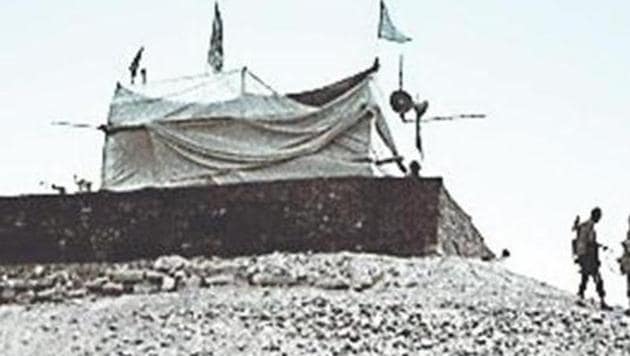UP Shia Board chief Syed Waseem Rizvi scripts, produces film on Ram temple
The trailer and poster of the movie, ‘Ram Janmabhoomi, produced and scripted by UP Shia Waqf Board chief Syed Waseem Rizvi, was released in Lucknow on Monday.
After batting for construction of Ram temple at the disputed site in Ayodhya, UP Shia Waqf Board chairman Syed Waseem Rizvi has now scripted and produced a movie on the vexed issue slated for release by December-end.

“Everyone is familiar with my stand on the issue. I have tried to broker an out-of-court settlement by suggesting that a Ram temple be built in Ayodhya at the disputed site. In lieu, a mosque ‘Masjid-e-Aman’ should be constructed in Lucknow,” said Rizvi at the release of the trailer and poster of his film “Ram Janmabhoomi” here on Monday. The poster depicts the picture of the 15th century ‘Babri-Mosque’ in Ayodhya that was razed on December 6, 1992.
The film’s announcement comes at a time when the RSS and BJP are pulling out all stops to mobilise people for the Vishwa Hindu Parishad’s (VHP) Dharma Sabha, a gathering of ‘sants’, to be held in Ayodhya on November 25. “We have shot the movie on a shoe-string budget ( ₹30-35 lakh) amidst great hardships in Ayodhya and Faizabad. We owe money to most of the actors, technicians, and artistes, who agreed to work on a token amount, and will pay them back when the movie is released,” said the Shia Board chairman.
Apart from chronicling the history of the age-old dispute, the role of politicians and radical clerics in fanning the divide between Hindus and Muslims, the two-and-a-half-hour-long movie also highlights another controversial practice, Halala (temporary marriage), among Muslims. Rizvi has not only written and produced the movie, but also played a cameo in the movie which is likely to raise many eyebrows for its political slant and oblique references to certain politicians.
For instance, the temple-mosque dispute is more than a century old – the first case was filed in court in 1885 – the take off point in the movie, according to Rizvi, is October 30 and November 2, 1990 when the then chief minister Mulayam Singh Yadav ordered police firing on ‘kar sevaks.’ The police officer is also shown referring to his political master as ‘netaji.’ “The story is a dramatised version of true events,” said the controversial Shia Board chief.
“The incident changed the communal atmosphere of the country. Subsequent events have been depicted through a story with the main protagonist dying with the dream of Ram temple in his eyes,” he added.
Rizvi said the structure at the place was never a mosque as a ‘masjid’ cannot come upon a disputed site. “Some ‘misguided supporters of Babar’, however, were out to spoil the atmosphere in the country over the disputed structure built by Babar’s commander Mir Baqi. No community has been targeted in the film. Instead, the wrongs, including ‘halala’, in the society have been targeted,” he said. Directed by Sanoj Misra, the film has Manoj Joshi, Govind Namdeo, Naznin Patni, Rajveer Singh, Disha Sachdeva and Aditya in important roles and produced under the banner of Cinecraft Production.



